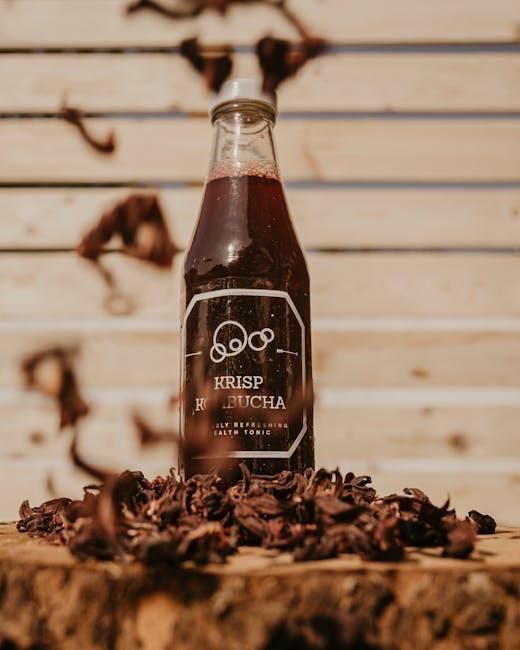Craving a fizzy drink with a tangy twist? Kombucha might just be your perfect match. This fermented tea has been dubbed a health elixir, but let’s address the elephant in the room – why does kombucha taste like vinegar? Let’s dive into the world of this tangy beverage to uncover the reasons behind its unique flavor profile.
Table of Contents
- Why Kombucha Often Has a Vinegary Taste
- Understanding the Fermentation Process of Kombucha
- Tips to Balance the Vinegar Flavor in Kombucha
- Exploring Flavor Variations in Kombucha Making
- Q&A
- Closing Remarks
Why Kombucha Often Has a Vinegary Taste
One of the main reasons why kombucha often carries a vinegary taste is due to the fermentation process it undergoes. During fermentation, yeasts and bacteria interact with the sugars in the tea, producing acetic acid, which is responsible for that tangy flavor reminiscent of vinegar.
Another factor contributing to the vinegary taste of kombucha is the presence of good bacteria, specifically acetobacter. These bacteria help convert alcohol into acetic acid, further intensifying the sour notes in the drink. So, while some may find the strong tang of kombucha off-putting, others enjoy the unique flavor profile it offers along with its potential health benefits.


Understanding the Fermentation Process of Kombucha
Kombucha, often described as tasting like vinegar, undergoes a fascinating fermentation process that gives it its unique flavor profile. During fermentation, a symbiotic culture of bacteria and yeast, known as SCOBY, interacts with sweetened tea to create this tangy and slightly effervescent beverage.
Key components of the kombucha fermentation process include:
- SCOBY: Responsible for initiating fermentation and imparting probiotics to the drink.
- Fermentation Time: Typically takes 7-14 days, during which sugar is converted into organic acids like acetic acid, giving kombucha its characteristic tanginess.
| Ingredient | Function |
|---|---|
| Tea | Provides nutrients for the SCOBY to thrive |
| Sugar | Food source for the fermentation process |


Tips to Balance the Vinegar Flavor in Kombucha
If your kombucha tastes too much like vinegar, fret not, as there are ways to balance out that intense flavor profile. Here are some handy tips to help you achieve a more harmonious taste in your brewed kombucha:
- Sweeten it up: Add a touch of sweetness to your kombucha by incorporating natural sweeteners like honey, fruit juice, or fresh fruit during the second fermentation process.
- Reduce the fermenting time: Shorten the fermentation period to lessen the tangy vinegar taste. Keep a close eye on your kombucha brew to prevent it from becoming overly acidic.
| Tip | Description |
|---|---|
| Infuse with herbs | Experiment with adding herbs like mint or lavender to impart a refreshing flavor that can help mask the vinegar notes. |
| Use flavored teas | Opt for flavored teas such as jasmine or chai for your kombucha base to introduce complex flavors that can balance out the vinegar undertones. |


Exploring Flavor Variations in Kombucha Making
When it comes to kombucha, the flavor journey is as diverse as it gets. From tangy citrus notes to floral undertones, the taste experience of this ancient fermented tea can be a wild ride. Understanding the art of flavor variations in kombucha making opens up a world of endless possibilities for crafting unique and delicious brews.
Experimenting with different ingredients like fresh fruits, herbs, and spices can elevate your kombucha game to new heights. Whether you prefer a zesty kick from ginger and lemon or a soothing hint of lavender and chamomile, the key lies in exploring and blending flavors that resonate with your palate. Embrace the creativity that comes with kombucha brewing – who knows, you might just stumble upon a winning combination that surprises even the most seasoned kombucha connoisseurs.
Q&A
**Q: Why does kombucha taste like vinegar sometimes?**A: Kombucha, the tangy and effervescent drink loved by many, can sometimes taste a bit like vinegar due to the fermentation process it undergoes.
Q: Is it normal for kombucha to have a vinegary flavor?
A: Yes, it is normal for kombucha to have a slightly sour or vinegary taste as a result of the acetic acid produced during fermentation.
Q: Can the vinegary taste of kombucha be adjusted?
A: The level of acidity in kombucha can be adjusted by controlling the fermentation time and the type of tea used, which may help in minimizing the vinegary taste.
Q: How can one enjoy kombucha if they are not fond of its vinegary taste?
A: If the vinegar-like flavor is too strong for your liking, try experimenting with different flavors, such as adding fruits or spices, to help mask the vinegary taste.
Q: Is there a way to make kombucha taste less like vinegar without compromising its health benefits?
A: While it’s difficult to completely eliminate the vinegar-like taste of kombucha, you can try reducing the fermentation time or adding natural sweeteners like honey during the brewing process to help balance out the acidity.
